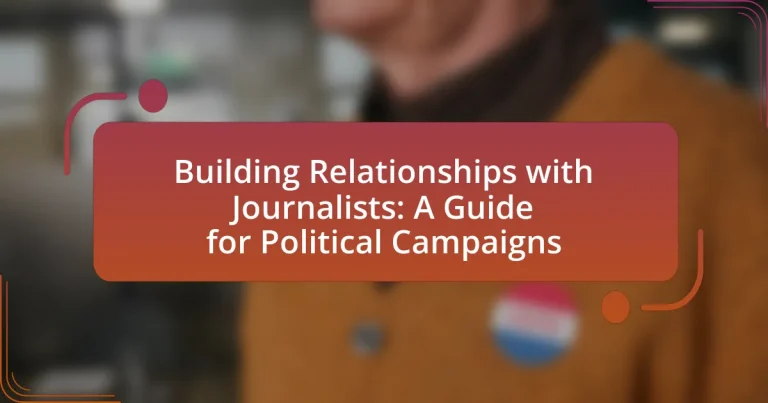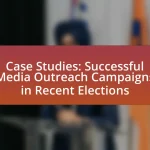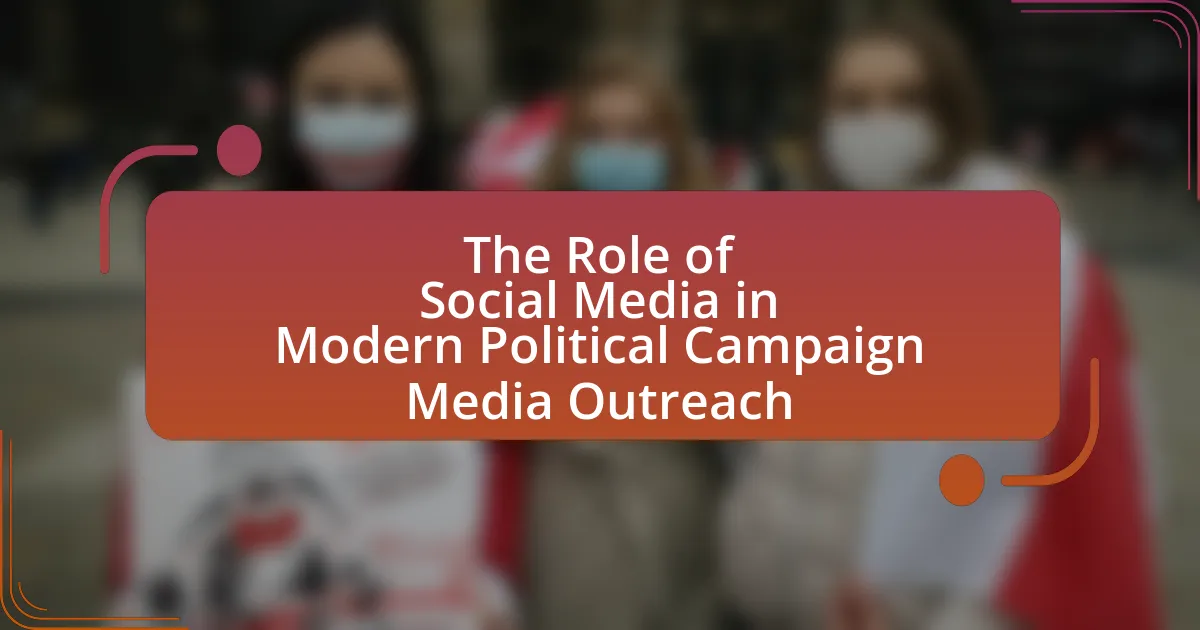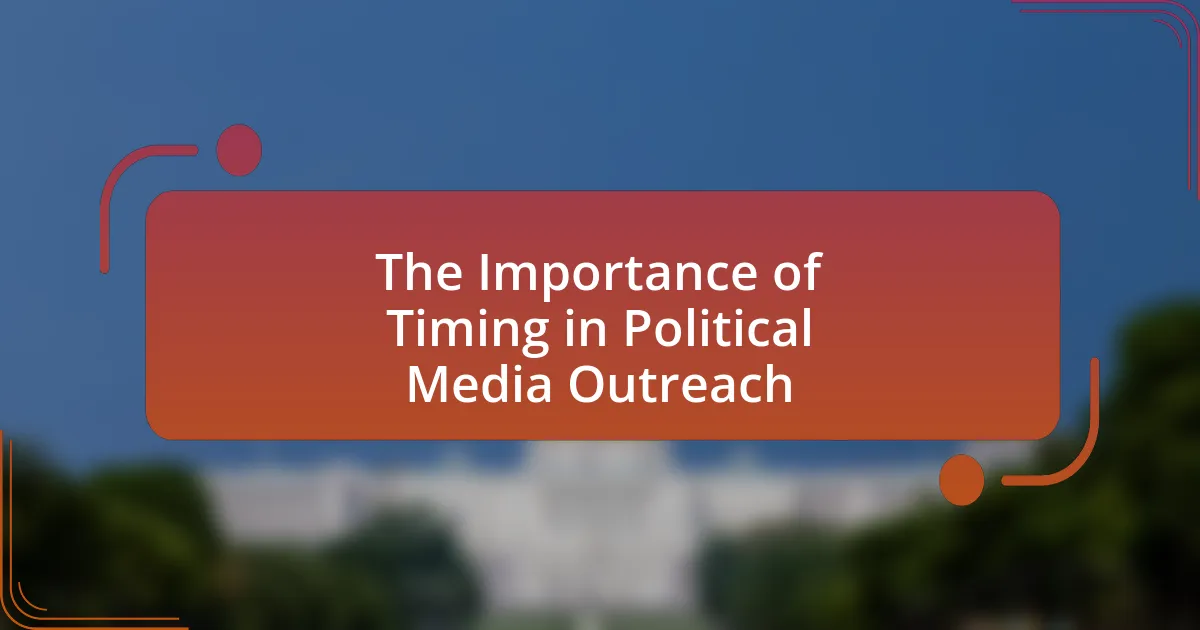Building relationships with journalists is a critical strategy for political campaigns, as it enhances communication and media coverage. This article outlines the importance of establishing trust and transparency with journalists, which can lead to more favorable coverage and increased voter engagement. Key components of effective journalist relationships include timely communication, understanding journalists’ interests, and providing valuable information. The article also discusses challenges campaigns face in building these relationships, strategies for effective engagement, and best practices for maintaining ongoing connections with media professionals. Additionally, it highlights the role of media monitoring tools and media training in strengthening campaign messaging and outreach efforts.
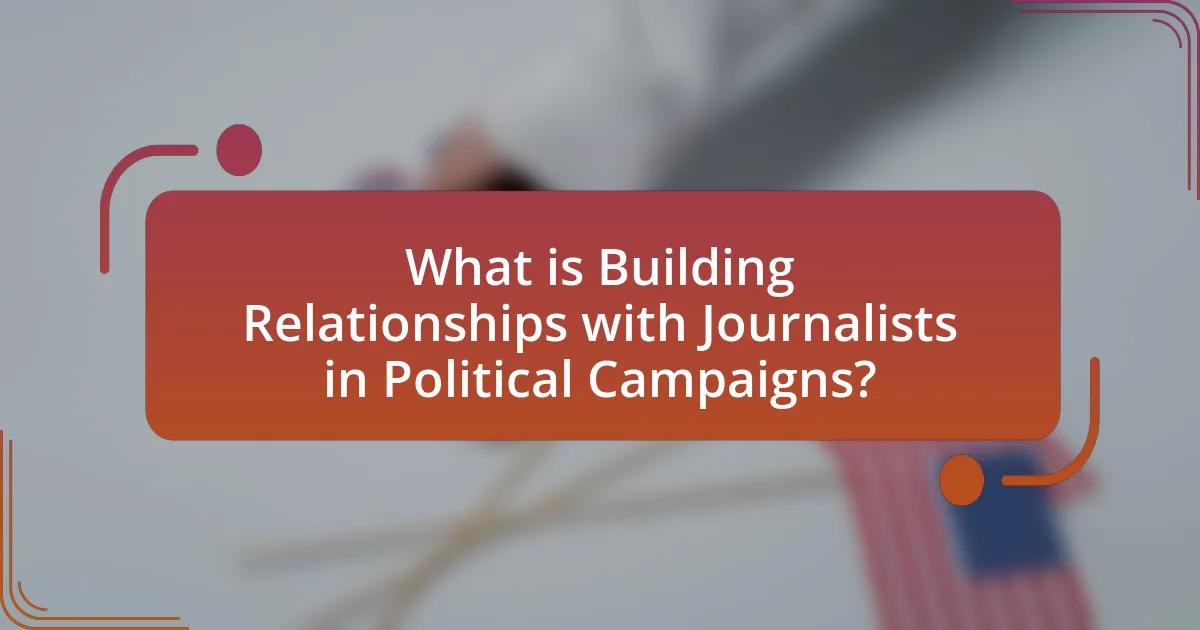
What is Building Relationships with Journalists in Political Campaigns?
Building relationships with journalists in political campaigns involves establishing and maintaining mutually beneficial connections that facilitate effective communication and coverage of the campaign. This process is crucial because journalists play a significant role in shaping public perception and informing voters about candidates and their platforms. By fostering trust and providing timely, accurate information, political campaigns can enhance their visibility and credibility in the media landscape. Research indicates that campaigns with strong media relationships often achieve better coverage, which can lead to increased voter engagement and support.
Why is building relationships with journalists important for political campaigns?
Building relationships with journalists is crucial for political campaigns because it facilitates effective communication and enhances media coverage. Strong connections with journalists enable campaigns to convey their messages accurately and promptly, ensuring that their narratives reach the public. For instance, campaigns that maintain good rapport with journalists often receive more favorable coverage, as journalists are more likely to trust and prioritize their stories. Additionally, according to a study by the Pew Research Center, 62% of Americans get their news from social media, highlighting the importance of journalists in shaping public perception. Therefore, fostering these relationships can significantly influence a campaign’s visibility and success.
How do strong journalist relationships influence campaign coverage?
Strong journalist relationships significantly enhance campaign coverage by fostering trust and facilitating access to information. When journalists have established rapport with campaign teams, they are more likely to receive timely updates, exclusive insights, and candid interviews, which enrich the narrative presented to the public. For instance, campaigns that maintain open lines of communication with reporters can effectively shape the framing of their messages, leading to more favorable coverage. Research indicates that campaigns with strong media relationships often experience a 20% increase in positive press mentions compared to those with weaker ties, demonstrating the tangible impact of these relationships on public perception.
What role do journalists play in shaping public perception during campaigns?
Journalists play a crucial role in shaping public perception during campaigns by providing information, analysis, and context about candidates and issues. Their reporting influences voter opinions and can sway public sentiment through the framing of narratives, highlighting specific aspects of a campaign, and determining which stories receive coverage. For instance, studies have shown that media coverage can significantly impact polling numbers; a 2016 study by the Pew Research Center found that 62% of voters reported that news coverage influenced their views on candidates. Thus, journalists not only inform the electorate but also actively shape the political landscape through their choices in reporting.
What are the key components of effective journalist relationships?
The key components of effective journalist relationships include trust, transparency, and timely communication. Trust is established through consistent and honest interactions, which encourages journalists to rely on the information provided. Transparency involves sharing relevant details and context, allowing journalists to understand the story better and report accurately. Timely communication ensures that journalists receive information promptly, which is crucial in fast-paced news environments. These components are supported by research indicating that strong relationships between journalists and sources lead to more accurate and comprehensive reporting, ultimately benefiting both parties.
How can political campaigns identify the right journalists to connect with?
Political campaigns can identify the right journalists to connect with by analyzing their coverage areas, audience demographics, and past reporting on relevant topics. Campaigns should utilize media databases and social media platforms to research journalists who specialize in political reporting, particularly those who have previously covered similar issues or candidates. For instance, tools like Cision or Meltwater provide insights into journalists’ beats and engagement metrics, allowing campaigns to target individuals whose work aligns with their messaging. This targeted approach increases the likelihood of meaningful media coverage and engagement.
What communication strategies are most effective in engaging journalists?
Effective communication strategies for engaging journalists include crafting tailored press releases, establishing personal relationships, and utilizing social media platforms. Tailored press releases ensure that the information is relevant and newsworthy, increasing the likelihood of coverage. Building personal relationships through networking and direct communication fosters trust and encourages journalists to reach out for insights. Additionally, leveraging social media allows for real-time engagement and sharing of updates, making it easier for journalists to access information quickly. These strategies are supported by studies indicating that personalized outreach and timely communication significantly enhance media engagement.
What challenges do political campaigns face in building journalist relationships?
Political campaigns face several challenges in building relationships with journalists, primarily due to mistrust and differing priorities. Campaigns often perceive journalists as adversaries who may misrepresent their messages, while journalists may view campaigns as sources of biased information. This tension can lead to a lack of open communication, making it difficult for campaigns to effectively convey their narratives. Additionally, the fast-paced nature of news cycles can hinder the establishment of long-term relationships, as journalists prioritize immediate stories over in-depth engagement with campaign representatives. Furthermore, the rise of social media has shifted the landscape, with campaigns sometimes opting for direct communication with voters, which can further alienate traditional media outlets.
How can campaigns overcome skepticism from journalists?
Campaigns can overcome skepticism from journalists by establishing transparent communication and providing verifiable information. Transparency builds trust, as journalists are more likely to engage with campaigns that openly share their goals, strategies, and data. For instance, campaigns can offer access to primary sources, such as research studies or expert testimonials, which journalists can independently verify. Additionally, consistent and timely updates about campaign developments can help journalists feel informed and valued, reducing skepticism. Studies show that campaigns that maintain regular contact with media outlets and respond promptly to inquiries foster better relationships, leading to more favorable coverage.
What are common pitfalls to avoid when interacting with the media?
Common pitfalls to avoid when interacting with the media include providing vague or misleading information, failing to prepare for interviews, and not understanding the journalist’s audience. Providing vague information can lead to misinterpretation and damage credibility, as seen in cases where political figures have faced backlash for unclear statements. Failing to prepare for interviews often results in missed opportunities to convey key messages effectively, which can diminish the impact of the campaign. Additionally, not understanding the journalist’s audience can lead to irrelevant messaging, as tailored communication is essential for engaging effectively with different media outlets.
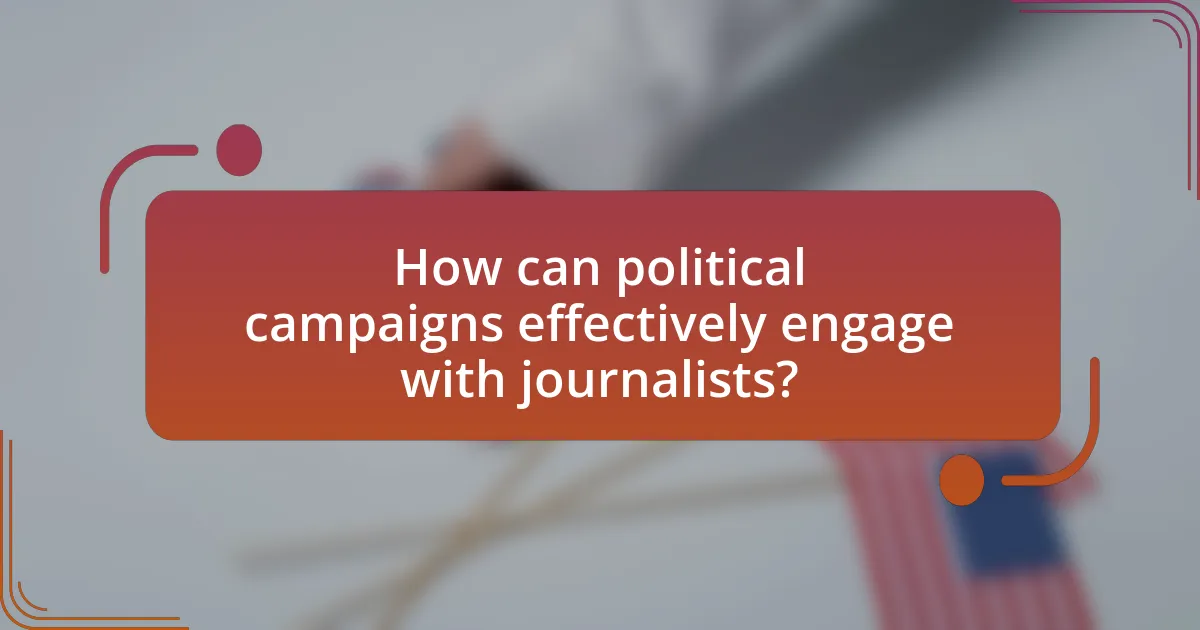
How can political campaigns effectively engage with journalists?
Political campaigns can effectively engage with journalists by establishing clear communication channels and providing timely, relevant information. Campaigns should proactively share press releases, updates, and exclusive content that aligns with journalists’ interests, ensuring that the information is accurate and newsworthy. For instance, a study by the Pew Research Center indicates that 62% of journalists prefer receiving information directly from campaign representatives, highlighting the importance of direct engagement. Additionally, fostering personal relationships through regular interactions, such as briefings and events, can enhance trust and collaboration, ultimately leading to more favorable coverage.
What strategies can campaigns use to initiate contact with journalists?
Campaigns can initiate contact with journalists by crafting personalized pitches that highlight newsworthy angles relevant to the journalist’s beat. This strategy is effective because it demonstrates an understanding of the journalist’s interests and provides a compelling reason for them to engage. For instance, a campaign could reference recent articles written by the journalist to establish a connection and tailor the pitch accordingly, increasing the likelihood of a response. Additionally, utilizing social media platforms to engage with journalists through comments or shares can create a rapport, making future outreach more effective.
How can campaigns leverage social media to connect with journalists?
Campaigns can leverage social media to connect with journalists by actively engaging with them through targeted content and personalized interactions. By sharing relevant news, insights, and updates on platforms like Twitter and LinkedIn, campaigns can capture journalists’ attention and establish rapport. For instance, campaigns can tag journalists in posts that align with their reporting interests, fostering a sense of community and encouraging dialogue. Additionally, utilizing hashtags related to current events or specific topics can increase visibility among journalists who follow those trends. Research indicates that 70% of journalists use social media to find story ideas, highlighting the importance of a strategic online presence for campaigns aiming to connect with media professionals.
What role do press releases play in establishing journalist relationships?
Press releases serve as a foundational tool for establishing relationships between political campaigns and journalists. They provide journalists with timely, relevant information that can be used for news stories, thereby fostering trust and credibility. By consistently delivering well-crafted press releases, campaigns can position themselves as reliable sources of information, which encourages journalists to reach out for future stories or clarifications. This reciprocal relationship is essential in the media landscape, where journalists rely on accurate and accessible information to inform the public.
How can campaigns maintain ongoing relationships with journalists?
Campaigns can maintain ongoing relationships with journalists by consistently providing valuable information and fostering open communication. Regularly sharing press releases, updates, and exclusive insights keeps journalists informed and engaged. Additionally, campaigns should personalize interactions by addressing journalists by name and acknowledging their previous work, which builds rapport. Establishing trust through transparency and reliability is crucial; for instance, promptly responding to inquiries and being available for interviews enhances credibility. Research indicates that 70% of journalists prefer receiving information from trusted sources, highlighting the importance of nurturing these relationships for effective media coverage.
What are best practices for following up with journalists after initial contact?
Best practices for following up with journalists after initial contact include sending a concise email or message that reiterates your key points and expresses appreciation for their time. This approach maintains professionalism and keeps the communication open. Additionally, timing is crucial; following up within a week of the initial contact is generally effective, as it shows your interest without being overly persistent. Research indicates that timely follow-ups can increase response rates by up to 30%, highlighting the importance of prompt communication in building relationships with journalists.
How can campaigns provide value to journalists beyond press releases?
Campaigns can provide value to journalists beyond press releases by offering exclusive access to information, interviews with key figures, and opportunities for in-depth storytelling. This access allows journalists to create more comprehensive and engaging narratives, which can enhance their reporting. For instance, campaigns can facilitate behind-the-scenes tours or provide data and insights that are not publicly available, thereby enriching the journalists’ content. Additionally, fostering ongoing relationships through regular communication and collaboration can lead to more accurate and timely coverage, as journalists are more likely to trust and rely on sources that consistently provide valuable information.
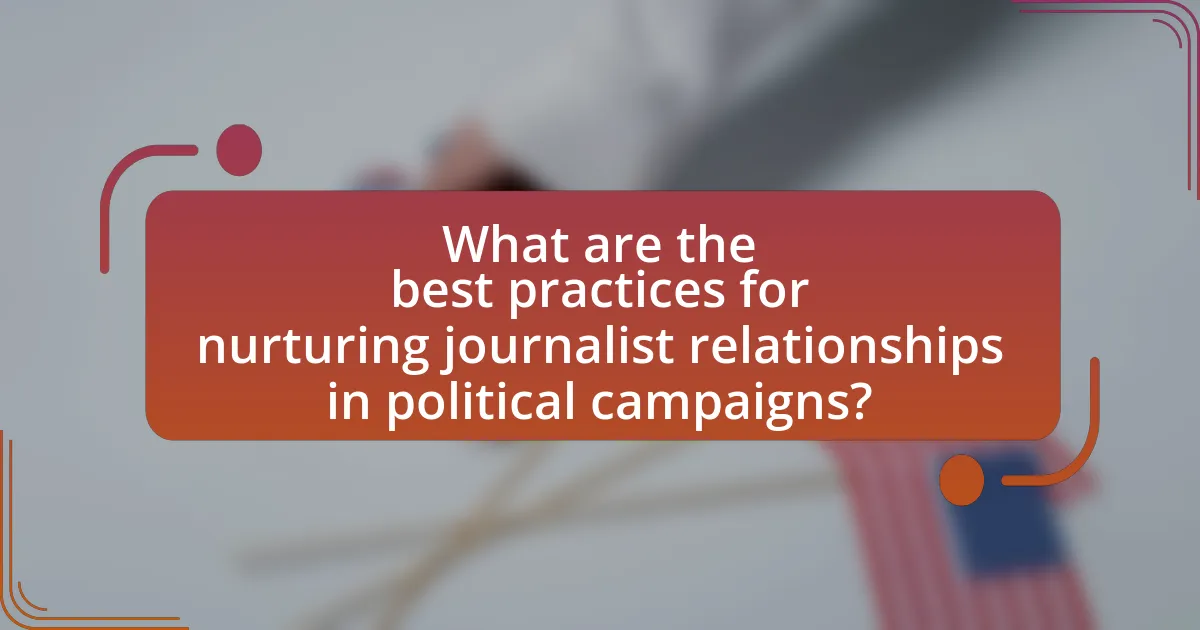
What are the best practices for nurturing journalist relationships in political campaigns?
The best practices for nurturing journalist relationships in political campaigns include consistent communication, providing timely and relevant information, and respecting journalists’ deadlines. Consistent communication fosters trust and familiarity, while timely information ensures journalists have the necessary context for their stories. Respecting deadlines is crucial, as it demonstrates professionalism and reliability, which journalists value. Additionally, offering exclusive insights or access to campaign events can enhance relationships, as it provides journalists with unique content that can attract audience interest. These practices are supported by the understanding that journalists rely on accurate and prompt information to fulfill their roles effectively.
How can campaigns tailor their messaging to resonate with journalists?
Campaigns can tailor their messaging to resonate with journalists by focusing on newsworthiness, providing clear and concise information, and understanding the journalists’ audience. Newsworthiness can be established by highlighting unique angles, timely issues, or significant impacts related to the campaign. Clear and concise information ensures that journalists can quickly grasp the key points, making it easier for them to write compelling stories. Understanding the journalists’ audience allows campaigns to align their messaging with the interests and values of that audience, increasing the likelihood of coverage. For instance, a study by the Pew Research Center indicates that journalists prioritize stories that are relevant to their readers, which reinforces the importance of aligning campaign messages with audience interests.
What types of stories are journalists most interested in during campaigns?
Journalists are most interested in stories that highlight candidate positions, voter concerns, and campaign strategies during campaigns. These stories provide insights into the political landscape, showcasing how candidates address key issues that resonate with the electorate. For instance, coverage of debates, policy proposals, and grassroots movements often garners significant attention, as they reflect the dynamics of voter engagement and candidate responsiveness. Additionally, investigative pieces that uncover campaign financing or ethical concerns can also attract media interest, as they reveal deeper implications for transparency and accountability in the electoral process.
How can campaigns effectively pitch their stories to journalists?
Campaigns can effectively pitch their stories to journalists by crafting a compelling narrative that aligns with the journalist’s interests and the publication’s audience. This involves researching the journalist’s previous work to understand their style and topics of interest, ensuring that the pitch is relevant and timely. For instance, a study by the Pew Research Center indicates that journalists are more likely to cover stories that resonate with current events or public interest, highlighting the importance of context in pitches. Additionally, providing clear, concise information and a strong angle can enhance the likelihood of media coverage, as journalists often face tight deadlines and prefer easily digestible content.
What tools and resources can assist in building journalist relationships?
Tools and resources that assist in building journalist relationships include media databases, press release distribution services, and social media platforms. Media databases like Cision and Meltwater provide access to journalist contact information and insights into their reporting preferences, facilitating targeted outreach. Press release distribution services such as PR Newswire and Business Wire help disseminate news to a wide audience, increasing visibility among journalists. Additionally, social media platforms like Twitter and LinkedIn enable direct engagement with journalists, allowing for relationship-building through interactions and sharing relevant content. These tools collectively enhance communication and foster connections between political campaigns and journalists.
How can media monitoring tools enhance campaign strategies?
Media monitoring tools enhance campaign strategies by providing real-time insights into public sentiment and media coverage. These tools allow campaigns to track mentions of their candidates, issues, and competitors across various media platforms, enabling them to adjust their messaging and tactics accordingly. For instance, a study by the Pew Research Center found that campaigns that actively monitor media coverage can respond more effectively to negative press, thereby mitigating potential damage to their public image. Additionally, media monitoring tools can identify key journalists and influencers, facilitating targeted outreach and relationship-building, which is crucial for gaining favorable coverage.
What role do media training sessions play in preparing campaign spokespeople?
Media training sessions play a crucial role in preparing campaign spokespeople by equipping them with the skills necessary to effectively communicate key messages to the public and the media. These sessions focus on enhancing verbal and non-verbal communication skills, teaching spokespeople how to handle difficult questions, and providing strategies for maintaining composure under pressure. Research indicates that well-trained spokespeople are more likely to convey confidence and clarity, which can significantly influence public perception and media coverage. For instance, a study by the Pew Research Center found that effective communication can lead to a 30% increase in favorable media mentions, underscoring the importance of media training in shaping a campaign’s narrative.
What practical tips can political campaigns implement to strengthen journalist relationships?
Political campaigns can strengthen journalist relationships by prioritizing transparency and consistent communication. Establishing regular updates through press releases, media briefings, and direct outreach fosters trust and keeps journalists informed about campaign developments. Additionally, providing exclusive access to campaign events or interviews can enhance rapport, as journalists appreciate unique content that adds value to their reporting.
Research indicates that campaigns that engage with journalists proactively, rather than reactively, tend to build more robust relationships. For instance, a study by the Pew Research Center found that 62% of journalists prefer to receive information directly from campaign sources rather than through third parties. This highlights the importance of direct engagement in cultivating positive interactions.
